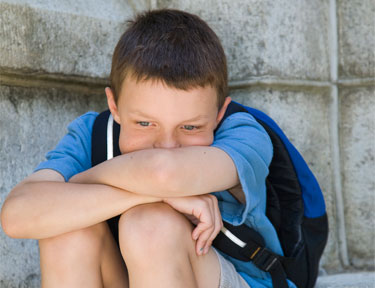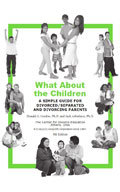
By Donald A. Gordon Ph.D. and Jack Arbuthnot Ph.D.
Preteens – children aged 9-12 – have a different and more mature response to a divorce than younger children. This age group is more advanced in their thinking, and they are able to see many points of view in the matter. Most of these preteens can understand some of the reasons for the divorce and children of this age will seriously and bravely try to make the best of it.
Preteens often hide the distress they are feeling. They may say they see their nonresident parent enough when in fact they miss him or her terribly. They may be afraid to ask for more time with their other parent because they know this will upset the resident parent.
About 25% of children at this age will take sides in the parents’ battle, most often siding with the mother – typically the parent with whom they spend the majority of their time. Although they are better able than their younger brothers and sisters to see both sides, they still tend to see things in black-and-white terms. This results in a need to label one parent as “the good guy” and the other parent as the “villain.” This may be because they still fear they will be left or abandoned. Further, they do not want to upset the parent who is their idol.
Children at this age are likely to feel intense anger, and may try to undo the break-up because they feel they have had no say in the matter. Unlike their younger siblings, they are very aware of their anger. Anger is normal in the break-up of a family.
A badly shaken sense of self is also common at this age. Children may have many health complaints or problems, including infections, headaches, stomach aches, asthma, etc. The stress the children are going through aggravates these problems. Doctors report that children from split homes come to their offices far more often than other children.
Family break-ups can also lead to problems with peers. Children may not have as many friends as before, and they may fear that their peers will reject them. Preteens maybe more likely to become friends with other “rejected” classmates. These new friends may have emotional or behavioral problems, which can lead to more serious problems: failing school, breaking laws, or engaging in risky sex, drug, or alcohol abuse.
Preteens have developed new thinking skills, which allow them to understand cause-and-effect relationships, but they still lack a larger view of how things work. They are likely to feel very let down, and they may “act out” by trying to hurt one or both of their parents using the power they think they have. They might say mean or unkind things, or accuse parents of changing or having moral lapses. They may refuse to spend time with the parent they now see as guilty.
Parents should not accept this: in a gentle way, make your preteens aware that you expect them to be civil and polite to both parents. Concrete examples may help. Remind them that even though Aunt Mary is bossy or Grandma is strict, the children must still go on family visits, during which they are expected to be polite. And even though they may not like a certain teacher, they must still show respect to him/her.
They can be given some control over minor aspects of their time with the other parent. For example, they could choose to take along a friend or suggest activities. Or, they could choose to call the other parent now and then, etc.
Divorce and Children: How to Help Your Preteen Child
Talk to them about their new life.
Children at this age need to be able talk to each parent about the break-up and about life after the break-up – to express their concerns, fears, and complaints. And they can understand a little about how the parents feel. It is okay to say that Mom and Dad do not agree about everything, but tell them that Mom and Dad do agree about the children. Be very honest about the chances for getting back together.
Let them safely voice their anger.
Parents should offer love and support to their preteens, and they need to acknowledge their children’s anger. Often, the children yearn for the parents to get back together. If this is not going to happen (and it usually isn’t), children should be told clearly and with no doubt; creating false hope does not help the children.
Avoid conflict in front of them.
Parents must control their anger towards each other. If their anger becomes violent, parents must disengage, and they should avoid contact until they learn control. Parents should minimize conflict in front of their children – this is very important if the conflict is unresolved or is spiteful. Children learn social skills by watching conflicts get resolved; if parents can negotiate and compromise, they model good social skills. This can lessen the effect of the conflict.
Give them permission to love and have contact with the other parent.
Parents must allow the children to love the other parent. Encourage children to call or write letters, and help the children give the other parent gifts on special days (birthdays, Christmas, Father’s Day, etc.).
Say good things about the other parent in front of the children: praise your ex’s good qualities. In spite of your anger and sadness, at one time you saw enough good qualities to want to marry or move in with this person; surely some of those qualities are still there!
Don’t make them “choose sides.”
Most parents are not aware how often they do this, and many truly believe they never do this. Trying to get children to side with you damages their relationship with the other parent, which leads to more stress and causes anger toward both parents.
Let teachers and your family doctor know about the situation.
Sometimes your preteen won’t tell you how they are feeling, but other adults in their life like teachers or your family physician may pick up important clues about how they are coping through changes in their behavior. Fill them in and enlist their help in supporting your child.

Related Articles
For more information about children’s issues during separation and divorce, visit www.DivorceMagazine.com – you’ll find lots of informative articles on the subject.
See also:
How Divorce Affects Preschoolers
How Divorce Affects Young Children
How Divorce Affects Teenagers







